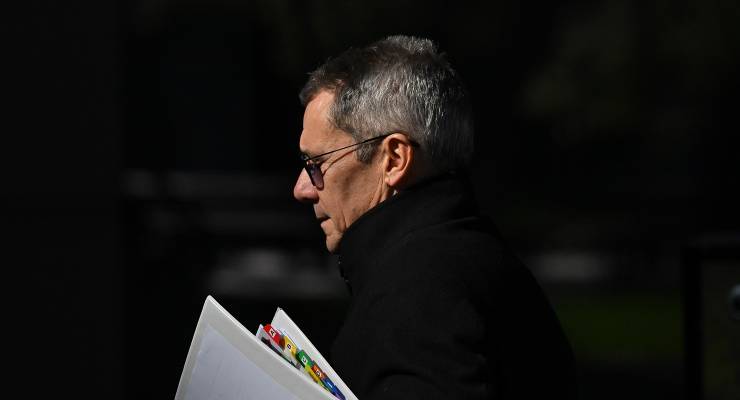
The public inquiry into the handling of the Bruce Lehrmann prosecution has heard ACT Director of Public Prosecutions Shane Drumgold may have breached his ethical obligations in several material respects, including in the making of “knowingly false” statements to the ACT Supreme Court.
The inquiry opened on Monday morning, calling Drumgold as the first witness.
After agreeing his role as a prosecutor required him to ensure the integrity of criminal trials and to conduct himself at all times with fairness and objectivity, Drumgold was asked a series of questions regarding the nature of advice he’d given TV presenter Lisa Wilkinson mid-last year with respect to her controversial Logies speech.
The speech — in which Wilkinson lauded Brittany Higgins as an extraordinary woman of courage — prompted Lehrmann’s defence lawyers to seek an urgent stay of the prosecution, which was granted by Chief Justice Lucy McCallum “through gritted teeth”.
At the time, McCallum expressed frustration at Wilkinson, noting she’d given the speech despite having received a “clear and appropriate warning” from Drumgold regarding the risk it posed to a fair trial.
This was widely reported by media at the time, with some commentators questioning whether Wilkinson’s conduct placed her in contempt of court.
On Monday, however, the inquiry revealed a series of emails that cast doubt on the contents of Drumgold’s advice to Wilkinson.
The inquiry learnt that on the day after the Logies, Drumgold directed a staff member to change the contents of briefing notes on his conversation with Wilkinson so that the notes reflected the risk carried by her speech.
According to a court transcript disclosed at the inquiry, Drumgold had told McCallum the briefing notes were “made by my instructor and contemporaneously” — a characterisation counsel assisting the inquiry Erin Longbottom KC described as “knowingly false”.
Drumgold resisted that description, arguing the part regarding the advice that had been added seemed “superfluous” to the rest of the document.
This prompted the head of the inquiry, former Supreme Court justice Walter Sofronoff KC, to interject: “The question is whether the note was contemporaneous. And, in fact, the note had been put together the day before that question [by McCallum] was asked. Therefore, the answer you gave to her honour was false.”
In answer, Drumgold conceded it was “unintentionally” false and that he was “probably in error” for misleading the court.
The inquiry then learnt that Drumgold had failed to comply with the terms of a subpoena it had issued him seeking all correspondence between him and Wilkinson — a failure Drumgold described as an “oversight”.
Among the correspondence he did not disclose were emails from Wilkinson’s solicitor, Marlia Saunders, relaying Wilkinson’s concerns that the court and, by extension, the media had misrepresented the advice Drumgold had provided her.
“As you have acknowledged during our two phone calls, Ms Wilkinson was never warned by you, during your meeting on 15 June 2022 or otherwise, not to give a Logies speech,” Saunders said.
“The reason Ms Wilkinson voluntarily raised the issue of the Logies speech with you during your meeting was because she was concerned to ensure that she did not do anything that may jeopardise the approaching trial.”
The emails show Saunders contacted Drumgold three times in December 2022, requesting that he correct media reports and point out that Wilkinson was not in contempt of court — possibilities he’d allegedly raised with her two days after the stay was ordered in June.
The relevant emails conclude by saying Wilkinson felt she’d been “treated unfairly” by Drumgold in his capacity as director of public prosecutions, and that the intense media attention was the reason for her decision to quit The Project.
Drumgold, for his part, did not accept that he’d ever told Saunders that he felt he should “correct reports” regarding the nature of advice he’d given Wilkinson, though he conceded he felt Wilkinson had been “poorly treated”.
When questioned whether it was courteous to fail to respond to Wilkinson’s concerns, Drumgold said his mind was otherwise preoccupied and that he “probably” should have taken a different approach.
He added that though he agreed the media reporting about Wilkinson was inaccurate, he thought it would be “ultra vires” for him to correct or comment upon it, notwithstanding assurances Wilkinson says he’d given her to the contrary.
“What I was being asked to do was completely beyond my remit,” he said. “Most of the media [was] already suggesting I’m overly protective of Ms Wilkinson.”
“Whatever sympathy I have for Ms Wilkinson, I’m not a publicist. I’m the director of public prosecutions.”
Though Drumgold eventually conceded he should have advised Wilkinson not to make the speech, he defended his initial line of thinking, pointing out that, to his mind at least, it would have run contrary to his role as director to provide such advice.
When pressed on whether that held true in light of his obligation to ensure a fair trial, he said that “in hindsight” it probably didn’t.
He then suggested he’d wrongly assumed Wilkinson had only raised the Logies speech in order to highlight she was up for some “lucky award”, implying that this was probably the reason he didn’t take her queries seriously.
“You thought she was bragging about being nominated,” asked Sofronoff, to which Drumgold said: “Well, that’s probably putting it a bit high, but of that flavour”.
The inquiry continues.








Crikey encourages robust conversations on our website. However, we’re a small team, so sometimes we have to reluctantly turn comments off due to legal risk. Thanks for your understanding and in the meantime, have a read of our moderation guidelines.